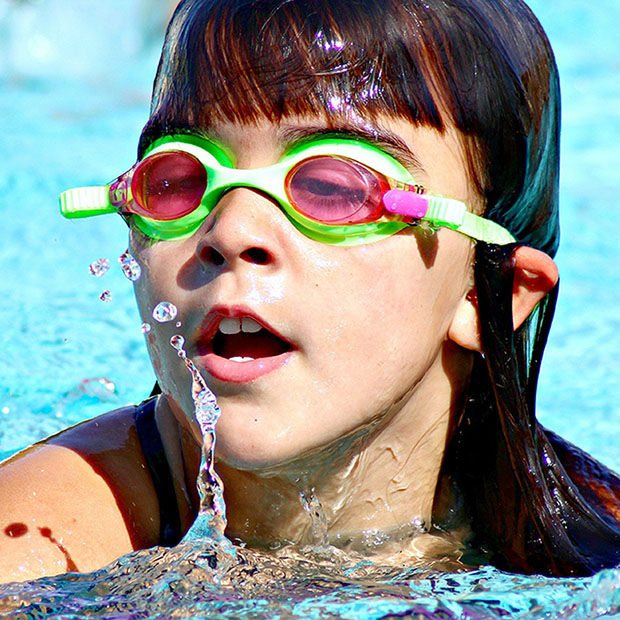Swimming Pool Eye Safety Tips

School’s out and it’s time for summer!
For many of us, summer time means a lot of trips to the pool, but before we dive in, we should take a look at what we should be doing to protect our eyes while we’re cooling off underwater.
Invest In A Good Pair Of Goggles
Have you ever felt a burning, stinging sensation when you opened your eyes underwater in a swimming pool? That sting isn’t from the chlorine itself, but a compound called chloramine. Chloramine forms when the chlorine in the pool reacts with dirt, urine, and oils that wash off into the water when people swim in it.
That might sound pretty gross, but the chlorine is what kills harmful bacteria and makes it safe to swim. Chloramine only causes a mild, temporary irritation for most people’s eyes, but you can avoid the sting (and protect yourself from eye injuries) by wearing goggles.
Make sure to choose goggles that fit well so that they can form a good seal over your eyes. If you wear glasses or contacts, you can even get prescription goggles so you can really enjoy those underwater sights!
Skip The Contact Lenses When You’re Swimming
Why get prescription goggles when you could just wear non-prescription goggles over your contact lenses? That may seem like a logical solution, but it comes with risks. There are a lot of harmful microorganisms that enjoy swimming as much as we do. Chlorine kills most of them, but not all, and we don’t want those little critters anywhere near our eyes.
There isn’t much to worry about if we’re swimming without contact lenses, but when we do wear them, they can act as petri dishes, trapping microorganisms like acanthamoeba against our corneas and giving them the perfect warm, wet space to multiply. These germs can cause dangerous infections and even permanent blindness, and they live in even the cleanest bodies of freshwater.
Another danger with contact lenses is that they simply aren’t designed for underwater wear. They might fall out and get lost, and soft contact lenses can shrink when exposed to water, which makes them tighten around the cornea, causing irritation. You’re better off leaving your contact lenses at home and trading off between glasses and goggles when you go to the pool.
Need Help Finding The Perfect Goggles?
If you’re not sure what to look for when shopping for goggles, just give us a call or stop by our practice. We’d be happy to offer you some recommendations. Not everyone’s swim gear needs are the same, but we all need good eye protection!
